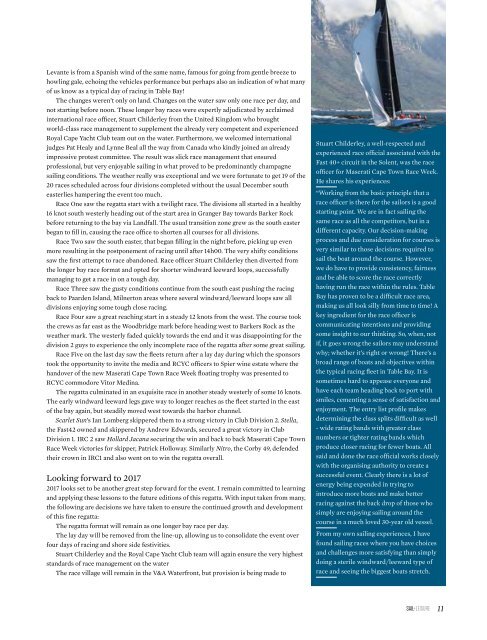You also want an ePaper? Increase the reach of your titles
YUMPU automatically turns print PDFs into web optimized ePapers that Google loves.
Levante is from a Spanish wind of the same name, famous for going from gentle breeze to<br />
howling gale, echoing the vehicles performance but perhaps also an indication of what many<br />
of us know as a typical day of racing in Table Bay!<br />
The changes weren’t only on land. Changes on the water saw only one race per day, and<br />
not starting before noon. These longer bay races were expertly adjudicated by acclaimed<br />
international race officer, Stuart Childerley from the United Kingdom who brought<br />
world-class race management to supplement the already very competent and experienced<br />
Royal Cape Yacht Club team out on the water. Furthermore, we welcomed international<br />
judges Pat Healy and Lynne Beal all the way from Canada who kindly joined an already<br />
impressive protest committee. The result was slick race management that ensured<br />
professional, but very enjoyable sailing in what proved to be predominantly champagne<br />
sailing conditions. The weather really was exceptional and we were fortunate to get 19 of the<br />
20 races scheduled across four divisions completed without the usual December south<br />
easterlies hampering the event too much.<br />
Race One saw the regatta start with a twilight race. The divisions all started in a healthy<br />
16 knot south westerly heading out of the start area in Granger Bay towards Barker Rock<br />
before returning to the bay via Landfall. The usual transition zone grew as the south easter<br />
began to fill in, causing the race office to shorten all courses for all divisions.<br />
Race Two saw the south easter, that began filling in the night before, picking up even<br />
more resulting in the postponement of racing until after 14h00. The very shifty conditions<br />
saw the first attempt to race abandoned. Race officer Stuart Childerley then diverted from<br />
the longer bay race format and opted for shorter windward leeward loops, successfully<br />
managing to get a race in on a tough day.<br />
Race Three saw the gusty conditions continue from the south east pushing the racing<br />
back to Paarden Island, Milnerton areas where several windward/leeward loops saw all<br />
divisions enjoying some tough close racing.<br />
Race Four saw a great reaching start in a steady 12 knots from the west. The course took<br />
the crews as far east as the Woodbridge mark before heading west to Barkers Rock as the<br />
weather mark. The westerly faded quickly towards the end and it was disappointing for the<br />
division 2 guys to experience the only incomplete race of the regatta after some great sailing.<br />
Race Five on the last day saw the fleets return after a lay day during which the sponsors<br />
took the opportunity to invite the media and RCYC officers to Spier wine estate where the<br />
handover of the new Maserati Cape Town Race Week floating trophy was presented to<br />
RCYC commodore Vitor Medina.<br />
The regatta culminated in an exquisite race in another steady westerly of some 16 knots.<br />
The early windward leeward legs gave way to longer reaches as the fleet started in the east<br />
of the bay again, but steadily moved west towards the harbor channel.<br />
Scarlet Sun’s Ian Lomberg skippered them to a strong victory in Club Division 2. Stella,<br />
the Fast42 owned and skippered by Andrew Edwards, secured a great victory in Club<br />
Division 1. IRC 2 saw Hollard Jacana securing the win and back to back Maserati Cape Town<br />
Race Week victories for skipper, Patrick Holloway. Similarly Nitro, the Corby 49, defended<br />
their crown in IRC1 and also went on to win the regatta overall.<br />
Looking forward to 2017<br />
2017 looks set to be another great step forward for the event. I remain committed to learning<br />
and applying these lessons to the future editions of this regatta. With input taken from many,<br />
the following are decisions we have taken to ensure the continued growth and development<br />
of this fine regatta:<br />
The regatta format will remain as one longer bay race per day.<br />
The lay day will be removed from the line-up, allowing us to consolidate the event over<br />
four days of racing and shore side festivities.<br />
Stuart Childerley and the Royal Cape Yacht Club team will again ensure the very highest<br />
standards of race management on the water<br />
The race village will remain in the V&A Waterfront, but provision is being made to<br />
Stuart Childerley, a well-respected and<br />
experienced race official associated with the<br />
Fast 40+ circuit in the Solent, was the race<br />
officer for Maserati Cape Town Race Week.<br />
He shares his experiences:<br />
“Working from the basic principle that a<br />
race officer is there for the sailors is a good<br />
starting point. We are in fact sailing the<br />
same race as all the competitors, but in a<br />
different capacity. Our decision-making<br />
process and due consideration for courses is<br />
very similar to those decisions required to<br />
sail the boat around the course. However,<br />
we do have to provide consistency, fairness<br />
and be able to score the race correctly<br />
having run the race within the rules. Table<br />
Bay has proven to be a difficult race area,<br />
making us all look silly from time to time! A<br />
key ingredient for the race officer is<br />
communicating intentions and providing<br />
some insight to our thinking. So, when, not<br />
if, it goes wrong the sailors may understand<br />
why; whether it’s right or wrong! There’s a<br />
broad range of boats and objectives within<br />
the typical racing fleet in Table Bay. It is<br />
sometimes hard to appease everyone and<br />
have each team heading back to port with<br />
smiles, cementing a sense of satisfaction and<br />
enjoyment. The entry list profile makes<br />
determining the class splits difficult as well<br />
- wide rating bands with greater class<br />
numbers or tighter rating bands which<br />
produce closer racing for fewer boats. All<br />
said and done the race official works closely<br />
with the organising authority to create a<br />
successful event. Clearly there is a lot of<br />
energy being expended in trying to<br />
introduce more boats and make better<br />
racing against the back drop of those who<br />
simply are enjoying sailing around the<br />
course in a much loved 30-year old vessel.<br />
From my own sailing experiences, I have<br />
found sailing races where you have choices<br />
and challenges more satisfying than simply<br />
doing a sterile windward/leeward type of<br />
race and seeing the biggest boats stretch.<br />
SAIL+LEISURE 11



